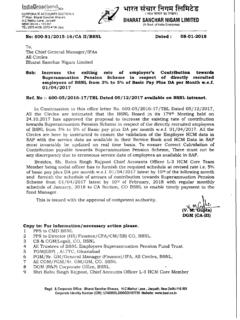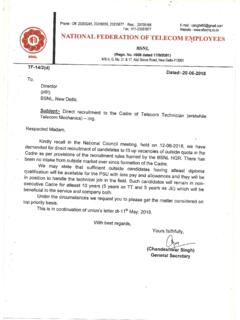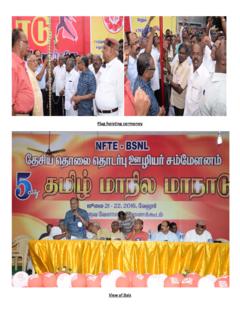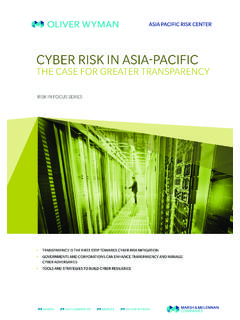Transcription of Inviting Public comments on Draft National Digital ...
1 Inviting Public comments on Draft National Digital Communications Policy 2018 The job of a National policy on Digital communications is to prepare the country and its citizens for the future. Achieving these goals would require that the key stakeholders namely the Centre, the States, local governments, Telecom Service Providers, Internet Service Providers, handset and equipment manufacturers, the academic community, the innovators and start-ups come together to forge a coalition to deliver this National policy and missions. The Draft of the National Digital Communications Policy 2018 is uploaded here for Public comments . The stakeholders and Public are requested to kindly go through the Draft policy and give their comments / inputs to make the National Digital Communications Policy- 2018 a robust document and an enabler for achieving the desired goals.
2 The comments can be submitted online through MyGov portal at The deadline for submission of comments is 25th May 2018 . National Digital Communications Policy 2018 Draft for Consultation Page | 1 National Digital Communications Policy 2018 Draft FOR CONSULTATION 01-May- 2018 National Digital Communications Policy 2018 Draft for Consultation Page | 2 Preamble 1. Digital infrastructure and services are increasingly emerging as the key enablers and critical determinants of a country s growth and well-being. With significantly advanced capabilities in both telecommunications and software, India, more than most countries, stands poised to benefit from harnessing the new Digital technologies and platforms; as a means to unlock productivity, as well as to reach unserved and underserved markets; thus catalysing economic growth and development, generating new- age jobs and livelihoods, and ensuring access to next generation services for its citizens.
3 2. The task before India s policy makers is to ensure that the advantages of the new technologies are accessible to all equitably and affordably; while securing them against existing and emerging threats. India needs to particularly ensure that its communications infrastructure supports the entire population, whose demographic profiles vary widely across various indices such as literacy, economic conditions and urbanisation. It is important for India to remain sensitive to these factors and promote policies that increase opportunities for their social and economic development. 3. Digital India is already unfolding. India s Digital profile and footprint is one of the fastest growing in the world. With over a billion mobile phones and Digital identities and half a billion internet users, India s mobile data consumption is already the highest in the world.
4 Over 200 million Indians regularly use social media and in the last year alone, over 200 million Indians took to mobile banking and Digital payments. At the current pace of digitisation and digitalisation, it is estimated that India s Digital economy has the potential to reach one trillion USD by 2025. The rapid and unprecedented proliferation of the mobile phone, the internet, social media platforms, Digital payments, data consumption and generation across India indicate that the data economy and Digital technologies and services are no longer the prerogative of the privileged few; but that they have indeed evolved into widespread instruments of access and empowerment for more than a billion Indians. 4. The objective of this document is to lay out a policy and principles framework that will enable creation of a vibrant competitive telecom market to strengthen India s long term competitiveness and serve the needs of our aspiring nation.
5 It has been broadly estimated that a 10% increase in broadband penetration in a country could potentially lead to an over 1% increase in GDP. However, studies in India estimate that the impact could be significantly higher for the country, given the increased productivity and efficiency gains that are likely to accrue to the economy. 5. Currently, India has approximately million kilometres of OFC, and less than one-fourth of the towers are fibre-connected. In order to expand mobile and broadband connectivity across the country, it is necessary to explore and utilise the opportunities presented by next-generation-networks like 5G and other pioneering network access technologies including satellite communications. It would be critical to focus on fixed infrastructure development National Digital Communications Policy 2018 Draft for Consultation Page | 3 initiatives related to fibre deployment and Right of Way clearances that will form the bedrock of next generation technologies.
6 6. While India has embarked on one of the world s largest rural optic fibre roll-outs in the world, aiming to connect 600,000 of its villages by broadband through its flagship initiative called BharatNet ; the convergence of a cluster of revolutionary technologies including 5G, the cloud, IOT and data analytics, along with a growing start-up community, promise to accelerate and deepen its Digital engagement, opening up a new horizon of opportunities. As the world prepares for what is increasingly being called as the fourth industrial revolution, India, and indeed every single sector of its economy, need to be readied to embrace this wave. 7. A robust, competitive landscape, which ensures availability of new communications technologies, services and applications, is central to the growth of GDP, productivity and creation of new jobs in the economy.
7 For consumers, competition leads to innovation, access to new technologies, improved quality, affordable prices and wider choice. Indian consumers need and deserve the widest range of services at competitive rates. The Policy seeks to promote and protect fair competition across the communications and Digital economy sector. 8. Improvement in regulation and ongoing structural reforms are the pillars of a sound policy initiative. Regulatory reform is not a one-off effort, but a dynamic, long-term and multi-disciplinary process. The Policy recognises the importance of continued improvement in the regulatory framework for attracting investments and ensuring fair competition, to serve the needs of Indian citizens. Given the sector s capital-intensive nature, the Policy aims to attract long-term, high quality and sustainable investments.
8 To serve this objective, the Policy further aims to pursue regulatory reforms to ensure that the regulatory structures and processes remain relevant, transparent, accountable and forward-looking. Additionally, the Policy aims to remove regulatory barriers and reduce the regulatory burden that hampers investments, innovation and consumer interest. The Policy also identifies steps to strengthen the sector s institutional mechanism and legislative framework, to ensure that India s economy and citizens can derive the full potential of its Digital communications sector. 9. If India s economic, social and political interests in the emerging data economy are to be effectively secured, its Digital sovereignty encompassing the data privacy, choice and security of its citizens requires to be kept in prime consideration while participating in the global Digital economy.
9 10. The objective of a National policy on Digital communications is to prepare the country and its citizens for the future. Achieving these goals would require that the key stakeholders namely the Centre, the States, local governments and agencies, Telecom Service Providers, Internet Service Providers, handset and equipment manufacturers, the academic community, the innovators and start-ups come together to forge a coalition to deliver this National policy and its missions. National Digital Communications Policy 2018 Draft for Consultation Page | 4 The National Digital Communications Policy, 2018 The National Digital Communications Policy, 2018 seeks to unlock the transformative power of Digital communications networks - to achieve the goal of Digital empowerment and well being of the people of India; and towards this end, attempts to outline a set of goals, initiatives, strategies and intended policy outcomes.
10 The National Communications Policy aims to accomplish the following Strategic Objectives by 2022: 1. Provisioning of Broadband for All 2. Creating 4 Million additional jobs in the Digital Communications sector 3. Enhancing the contribution of the Digital Communications sector to 8% of India s GDP from ~ 6% in 2017 4. Propelling India to the Top 50 Nations in the ICT Development Index of ITU from 134 in 2017 5. Enhancing India s contribution to Global Value Chains 6. Ensuring Digital Sovereignty National Digital Communications Policy 2018 Draft for Consultation Page | 5 Vision To fulfil the information and communication needs of citizens and enterprises by establishment of a ubiquitous, resilient, secure and affordable Digital Communications Infrastructure and Services; and in the process, support India s transition to a digitally empowered economy and society.














